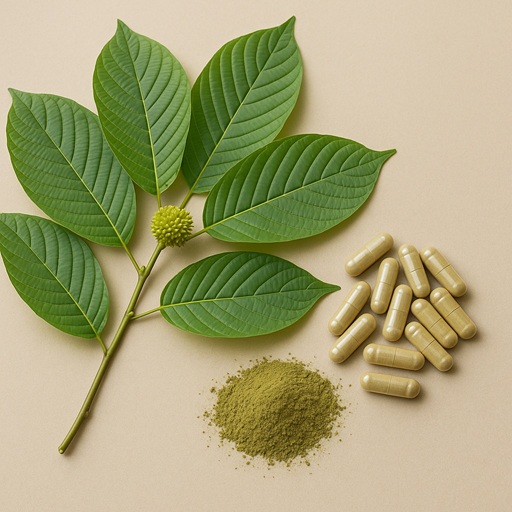Kratom is illegal in Indiana for everyone, with a long‑standing statewide ban that treats it as a controlled drug rather than a dietary supplement. This makes Indiana one of the strictest states in the U.S. on kratom, in contrast to neighboring states that allow regulated sales.
How Indiana Law Treats Kratom
Indiana first moved against kratom in 2014 by targeting its key alkaloids, mitragynine and 7‑hydroxymitragynine. These compounds were placed into the state’s controlled‑substances framework, effectively banning any product that contains them, including natural kratom leaf, powders, capsules, teas, and concentrates.
Under this approach, kratom is not viewed as a herbal supplement but as a substance comparable to other Schedule I or “synthetic” drugs with a high potential for abuse and no accepted medical use under state law. Because the ban is statewide and explicit, there is no part of Indiana where kratom is legal to possess or sell.
Possession, Sale, and Penalties of Kratom in Indiana
Simply possessing kratom in Indiana can be charged as a criminal offense. For personal‑use amounts, possession is typically treated as a Class A misdemeanor, which can carry up to one year in jail and fines that may reach around 5,000 dollars under Indiana sentencing guidelines. Even small quantities are enough to trigger charges, since the law does not distinguish between “small” and “large” possession thresholds for legality; any amount is unlawful.
Penalties become more severe when there is evidence of selling, dealing, or trafficking. Selling or distributing kratom may be prosecuted as a felony offense, with possible prison terms ranging from roughly 2 to 8 years and fines up to about 10,000 dollars, with higher exposure for repeat offenders or larger operations. Retailers caught stocking kratom can face criminal charges, forfeiture of inventory, and potential loss of business licenses.
Enforcement in Practice in Indiana
Law‑enforcement agencies in Indiana have clear authority to seize kratom products wherever they are found, including gas stations, smoke shops, or shipments passing through the state. Because the law explicitly bans kratom’s active alkaloids, officers do not need to prove that a product is “intended for human consumption” in order to treat it as illegal.
This creates particular risk for people crossing state lines. A person who buys kratom legally in Michigan, Ohio, or Illinois and then drives into Indiana still violates Indiana law as soon as they carry the product over the border. Defense attorneys in the state consistently warn that “I bought it legally elsewhere” is not a defense once you are in Indiana.
Comparison With Neighboring States
Indiana’s policy stands out sharply compared to surrounding states. Michigan and Ohio allow kratom but are gradually moving toward more structured regulation, such as age limits, labeling rules, and lab‑testing requirements. Illinois permits kratom at the state level with restrictions, such as 18+ age limits and some local controls, while Kentucky has debated bans but has not enacted a full statewide prohibition.
In this regional context, Indiana is an outlier: it is the only state in its immediate area with a clear, long‑term, statewide criminal ban on kratom. This difference matters for cross‑border travel and online purchases, because kratom that is perfectly legal in a neighboring state becomes contraband once it enters Indiana.
Attempts to Change Indiana’s Kratom Law
Advocates have tried several times to replace Indiana’s ban with a regulated model similar to Kratom Consumer Protection Acts in other states. Earlier proposals and public campaigns argued that kratom should be legal but subject to age limits, purity standards, and labeling requirements rather than outright prohibition. These efforts point to other states’ experiences where regulation is used to reduce risks from adulterated products.
In 2025, House Bill 1542 was introduced to address kratom regulation, with discussions around removing kratom from the strictest scheduling and establishing a more nuanced framework. However, no reform bill has passed both chambers and been signed into law, so the original ban remains fully intact. Indiana continues to appear on national lists of states where kratom is entirely illegal, with no carve‑outs or consumer protections to soften that stance.
Practical Takeaways
For anyone living in or traveling through Indiana, the key point is straightforward: any possession, purchase, or sale of kratom is illegal under current state law. Carrying kratom across state lines into Indiana, ordering it online for delivery to an Indiana address, or stocking it in a retail store all carry potential criminal consequences, including arrest, fines, and jail time.
Until the legislature passes and implements a new law, kratom users who move through Indiana should leave kratom out of vehicles and luggage to avoid violations. Vendors should not ship to Indiana addresses or operate kratom businesses in the state, as Indiana treats kratom in line with its Schedule I drug policy and actively enforces that classification.

